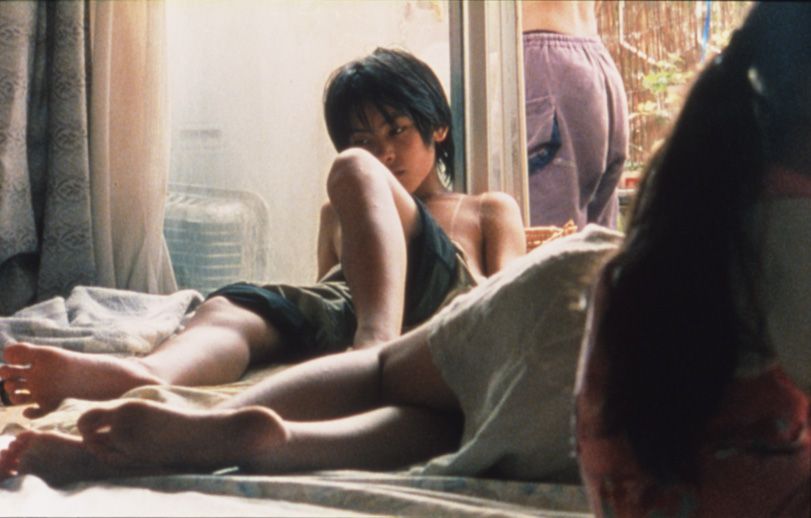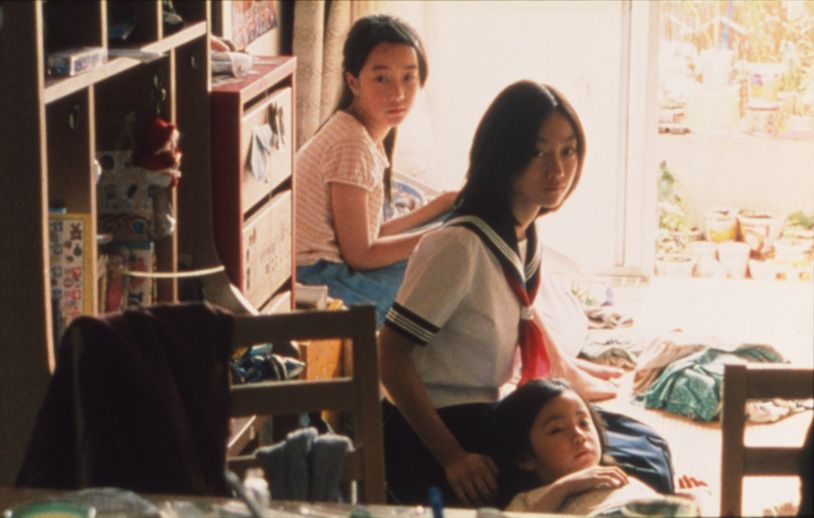A scene from Nobody Knows by Hirokazu Koreeda
The Japanese filmmaker Hirokazu Koreeda is fascinated by what makes a family. Shoplifters, which came out last year, follows a poor couple living in modern Tokyo who regularly filch food to survive. At the start, it’s easy to assume that the old lady with whom they live, and the youngsters hanging around form a proper—if hard-up—nuclear family. Gradually, though, you realise they are a group of drifters brought together by circumstances. What starts off as heart-warming ends up macabre. They give shelter to an abused young girl, almost inadvertently kidnapping her; they go to extreme lengths to keep a death secret.
Koreeda’s work asks important questions: what does it mean to be a family—especially in Japan, which cleaves to more conservative norms than western countries? And how does poverty—more common in Japan that outsiders might think—twist social relations?
Such themes are longstanding in Japanese cinema. The filmmaker that Koreeda is most often compared with is Yasujir Ozu, whose beautifully conceived films about post-war Japan also examine the intricate relations between parents and children, duty and freedom. Koreeda himself is wary of the comparison: “It’s interesting,” he has said, “but it troubles me when people say I’m like Ozu, because I’m not confident I understand Ozu.” In the same interview, though, he confesses to studying him closely, and there are certainly similarities not only of theme but of style. The cutaway shots to a flower or tree, the focus on faces, the slow narrative buildup leading to a quietly shocking conclusion.

All these are present in Koreeda’s 2004 film Nobody Knows, a companion piece to Shoplifters. (Following the BFI season dedicated to the auteur in the spring, Nobody Knows is now being released on DVD with three other early films under the title Of Flesh and Blood.) It is based loosely on the 1988 Sugamo case, where a group of children abandoned by their single mother was found living in squalor in Tokyo. Nobody Knows explores how this could have come about without the neighbours or other adults intervening. The mother, played by Japanese TV star You, has four children by four different men. A child-like woman with a high-pitched voice, she once dreamed of becoming a singer but has been chewed up by the music industry. She goes on dates and comes home smelling of booze, while telling her children “You wouldn’t have any fun at school” and keeping them locked up. In reality, she is afraid of her landlord finding out about her unregistered children, and manoeuvres the little ones into her new flat in a suitcase.
Left to fend for the family is 12-year-old Akira, played by Yya Yagira, the youngest actor ever to be honoured at Cannes. The early humour comes from his prim attitude towards his mother, and his resourcefulness in playing “dad” to his siblings. Unlike the characters in Koreeda’s later film, he doesn’t want to resort to shoplifting. After his mother disappears with her new boyfriend, he heads to a number of his possible fathers to ask for help. “I’m in trouble myself,” one says self-pityingly, but gives him the money anyway. No character is presented here other than in shades of grey.
If the stereotype of Japanese society is of order, restraint and delicacy, then Koreeda likes upending such expectations. The aesthetic here is far from elegant. The children slurp down fast-food noodles (as do the family in Shoplifters) in a messy house wearing ragged clothes. As the seasons change and the weather heats up, we see Akira and his brother stripped to the waist and sweating. Filmed over a year in real-time the children age at the same rate: Yya Yagira’s voice breaks during the action.
Akira gets bored of his role as house dad and starts hanging round a video arcade, making friends with boys his own age. In the real Sugamo case, a child was found to have been killed by friends similar to these, though that doesn’t happen here. There is a tragic death, but it is more a crime of neglect to be laid at the door of all those who do, in fact, know what's going on. The mother, of course, the useless fathers, the wilfully incurious neighbours, and even the film’s hero Akira, who fears he and his siblings will be sent to an orphanage and so keeps his mother’s secret.

The misjudged ending of Shoplifters, when we see the fallout and police investigation, is avoided here: the frame never expands beyond the central characters. For me, it is most memorable for its images: one sister playing her red toy piano, saving fruitlessly for a real one; the older children’s amateur efforts to teach Yuki, the youngest, to write. Or when Akira slaps away the money offered to him by Suki, a schoolgirl who befriends him, because she has earned it by singing Karaoke with a businessman. It is partly jealously—he has a silent crush on her—and partly that she reminds him ominously of his mother.
As Alexander Jacoby points out in his DVD sleeve notes, Nobody Knows reverses the dynamic of Ozu’s Tokyo Story, in which the children neglect their ageing parents. That reversal says much about the impact of modern working patterns and a newly atomised Japan. But it is also a very human—and humane—story of the harm caused when people treat others, even their children, as extensions of their own desires. And of how goodness can grow in straightened circumstances—even though, in this case, goodness is not enough.
Of Flesh and Blood: The Cinema of Hirokazu Koreeda is out from the BFI












